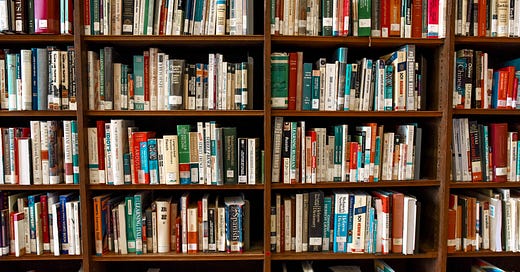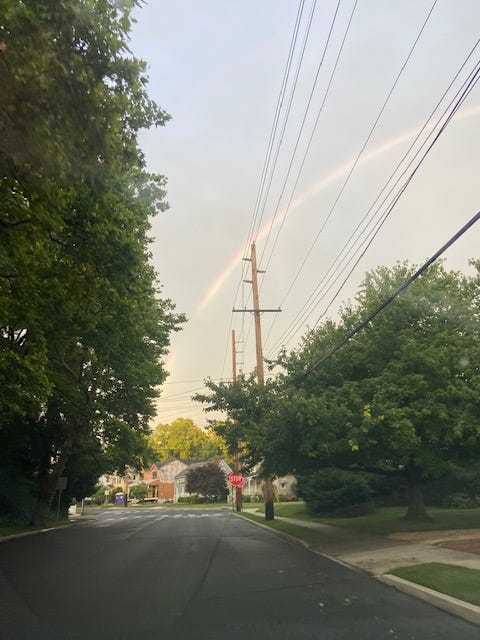Why it's a good time to visit your local library
Want to connect with your community and get a bunch of free shit? There's a place for that!
There was a decade, probably between 1998 and 2008, where I didn’t walk into a public library a single time. This is, I think, probably a common American experience. At some point, you stop going there for Story Time and you can rely on your school library for books, and then you buy a Kindle which is useful for traveling, even if it is made by the worst corporation ever1, and you just kinda forget that in nearly every town, there is one building that is just chock-full of free books.
You may yourself still be in this phase. You may not be a big reader, but instead are an audiobook and podcast listener, relying instead on platforms like Audible and Spotify and Stitcher. You may appreciate the convenience of services like Amazon or, slightly more ethically, BetterWorldBooks, Bookshop.org, Thriftbooks, and Indiebound.
I would like to argue that now is the time for you to return to your local library. Just this once! Just to familiarize yourself with what’s available to you. Because you’ve likely changed locations since you were a kid, and may not be familiar with your local library system, or the sheer amount of what’s available to you these days.
Here’s what to look for:
1. Expanded services in the internet era
The internet has replaced the library as the primary repository of knowledge for most people, and as a result, libraries have had to pivot to more than just being the place where one could access books and conduct research. It is still both of those things, but they’ve also expanded access to things that you might otherwise have to pay for. This includes:
eBooks
Audiobooks
Streaming video
Research databases
Academic papers
Magazines
Newspapers (including online versions)
Genealogy databases like Ancestry
Language learning resources like Rosetta Stone
Lifelong-learning courses
2. Community programming
Libraries also offer extensive community programming. Some of this is informational, lifelong-learning style stuff, while some of it is just fun stuff like parties, poetry readings, and small concerts. Much of the programming is kid-oriented, but adult programming is common as well.
The library I used to work at offered monthly conversations around topics like race, sustainability, nutrition, and local civic issues (i.e. pollution remediation, stormwater management, elections, etc.).
We also had a digital literacy lab which helped people (all for free) catch up with the generational and class digital divide. So think classes on how to use Gmail, Microsoft Word, how to submit your taxes online, etc. This lab also offered one-on-one tutoring.
Many libraries offer creator and coworking labs, where people can record podcasts or book private working spaces for work-from-home conference calls.
We had book clubs, weekly yoga/exercise classes, mahjong, and periodic town walking tours conducted by local historians.
Children’s rooms offer even more: regular story hours, arts and crafts, STEM activities, video game tournaments, and movie nights.
If your library does not have something you’d like to see — ask to speak to the person in charge of their programming! These programs are often community led, and most librarians are thrilled to let local people organize programs for them. Many libraries have small budgets for this stuff, so pay is iffy, but if you’re willing to do it for free, they’ll be happy to give you space as long as the program fits their policies.
3. Free books!
Aside from the books that are available to check out, many libraries offer free or cheap books.
Lots of people want to donate books to libraries, and libraries don’t always have the space on their shelves, or the books that have been donated are duplicates. As a result, many of them offer Book Sale rooms. These rooms typically offer incredibly cheap books (at ours, the most expensive book was $2) with the funds going to help with library programming.
Often, there are enough excess books that they can’t even sell all of them, so they’ll have a free cart.
Another thing that libraries regularly have to do is something called weeding. In short, libraries have finite shelf space and new books are coming out all the time. So books that don’t circulate all that much get “weeded” and are either offered up for sale or thrown out. Ask your library what they do with weeded books — they may be filling up a trash can in the back, which they’d be happy to let you pick through.
4. Alternative libraries
Libraries have also started to expand out what they offer for circulation. Aside from books, DVDs, music, and audiobooks, which have been in circulation for a while now, many libraries now offer one or more of the following:
Seed libraries (literally just free seeds for your garden)
Puzzle libraries (since these are often single-use)
Tool libraries
Cake-pan libraries
Video game libraries
Circulating laptops and/or wifi hotspots
5. Social Services
On top of offering just things and programs, libraries are increasingly becoming community centers. This is in some ways their de facto position: as one of the only remaining places in most towns where literally anyone can come and hang out for free, they often shelter the homeless, the vulnerable, and the marginalized.
That means that if it’s very cold, many people who don’t have anywhere else to go warm up at the library. Same if it’s very hot. This is why you should never judge a library for having homeless people in it. This is a good thing! You can go somewhere else! They may not!
Because of this spot at the center of your community, many libraries now help people in a wide variety of ways:
Gaining access to social services like Medicare/Medicaid
Helping people find housing
Helping marginalized people find legal help
Connecting homeless with warming centers and beds
Helping people fill out their taxes
Helping people find employment
Helping people earn GEDs
Offering free canned foods/diapers/toiletries
Many librarians are trained in administering NARCAN and in conflict de-escalation.
Even if these are not services you personally need to avail yourself of, they are still worth knowing about in case you know of anyone who ever might.
Why you should visit your library now
Aside from everything listed above, this is a good time to get on board with your library because it’s the beginning of May, and in about a month, your library is likely to be targeted by cryptofascist goons and homophobes because of any pride month activities they choose to take part in.
Libraries as a whole are inclusive places, that seek to make anyone and everyone comfortable as long as they can do so without disrupting anyone else. They are actively engaged in connecting LGBTQ+ people (especially teens) with information that they may have a hard time accessing elsewhere.
Because of this, many libraries are under attack from the right, who see them as promoting a “woke” or gay agenda. The American Library Association’s List of the Most-Banned Books is largely made up of books focusing on sexuality and gender (with race and police brutality thrown in for good measure), and libraries in particular are being targeted by the far right for putting on Drag Queen Story Hours. You can read my account of our library’s DQSH last year (and the ensuing backlash) here:
What it's like to throw a Drag Queen Story Hour
This article can be read or listened to! My audio version below contains an extra few minutes of me editorializing at the end. I mean, this is all technically me editorializing, but yeah, there’s a bit more of it on the audio version. Carry on! So I’m doing something a little different this week: I’m gonna talk about my day job. I work at a public librar…
But the TL;DR is that after our first hour was disrupted by right-wing morons, our community showed up in force for our next hour, and surrounded our building with a wall of rainbow love. This made both the librarians and the parents inside feel infinitely safer, and it is absolutely necessary for any library doing a similar event this year.
Please show up for your library! They are here for you! You need to be here for them!
It is definitely not the worst corporation ever, but man, anything that single-handedly killed the community bookstore across an entire country is real fucking bad.




